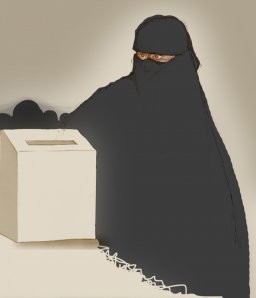November 2nd 2011
I know my rights
Saudi women can now vote and run for office, but there’s more to the royal decision than meets the eye
Women in Saudi Arabia seem like they are always waiting for a royal decision to have their rights given to them. In 1960, women were granted the right for education by King Faisal bin Abdul-Aziz, despite opposition from the public.
After 50 years of living with this decision, the results are clear.
According to the World Bank report, there are more female students in higher education in Saudi Arabia than in Jordan, Lebanon, Tunisia or West Bank-Gaza. Women in this country realize that they don’t want to wait another 50 years to have another basic right.
As an example of this, a group of women last June defied a nationwide ban that keeps them from driving.
This step seems to be a very small one toward reaching equality between men and women, but at least it starts things moving.
Unfortunately, the authority’s response to this event was to detain the women who drove their cars and to continue to ban women from driving.
Surprisingly, on Sept. 25, the king of Saudi Arabia announced that women will be allowed for the first time to join the unelected parliament. Women will now be able to vote and run for office starting at the next municipal councils in 2015.
This is the most significant step forward in Saudi women’s rights since the girls’ education decision in 1960.
A lot of women have been dreaming of this for long time, and many were surprised by the decision. As a Saudi woman, I was also surprised, but at the same time I couldn’t be wholly optimistic about it.
I garnered conflicting messages from the announcement.
Women in Saudi Arabia realize that they don’t want to wait another 50 years to have another basic right
The first one, which is positive, was that King Abdullah bin Abdul-Aziz believed that this action would lead to women’s empowerment and political reform.
The second message was that this was just a way to bend to the international community in order to avoid the embarrassment of being so far behind the rest of the world when it comes to women’s rights.
Looking at it in this context, the women’s involvement in the municipal election and parliament wouldn’t be positive, but a sham. There are examples of this throughout the Middle East.
Afghanistan parliament, for example, has women elected, but this doesn’t make Afghanistan a democratic country or a better place for women.
As a matter of fact, some of those women are warlord’s allies, and most of the time they work against women’s well-being because there is no way to oppose the warlords’ patriarchal government.
Even if there were a women who decided to talk honestly or fight for women’s equality, they would end up dismissed from the parliament.
Malalai Joya was a good example of a woman who was dismissed for publicly denouncing the presence of what she considered to be warlords and war criminals in the Afghanistan parliament.
In light of the possibilities at hand, the most important thing is for women in Saudi Arabia to benefit from this powerful right and keep pushing to gain more rights, so that we can consistently enhance women’s status there.
http://uniter.ca/view/6846/













2 comments:
You've got some really great articles here - I had a lot of catch up reading to do!
I too am skeptical about Saudi women being allowed to vote - 2015 is several years away and there's no telling what kind of wrench can be thrown into the mix by that point. Still, I've got to hand it to King A on behalf of his efforts for Saudi women - even though he's up against a very tough religious establishment.
Thanks Susie for you valuable comment.
Post a Comment